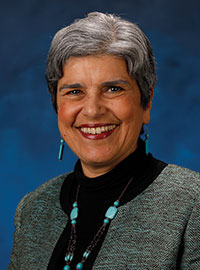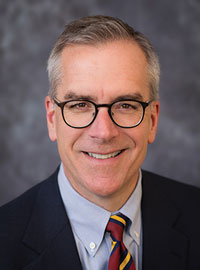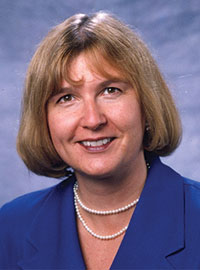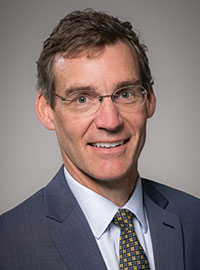
Cynthia Haq, MD
Cynthia Haq, MD
Resident alumna (Madison ’87); Chair, University of California, Irvine Department of Family Medicine
Your most valuable experience at DFMCH?
When I was a resident, there were no work hour restrictions. I didn’t know if I could survive my R1 year with two children ages one and five, and another on the way. Dr. Marc Hansen supported me taking parenting leave, extending the final two years of residency into three, and sharing a position. It saved my sanity and my career!
Whose influence still resonates?
Dr. Gene Farley was my hero and icon. He taught us to always think of the patient in the context of their family, and to remember those who might not be coming in for visits. He and Dr. Hansen supported me creating a pediatric elective in child survival in Uganda, which shaped my career in global health.
Dr. Ken Kushner stimulated my interest in doctor-patient communication, patient-centered practice and deep reflection.
What is your biggest accomplishment?
As a family physician in Belleville, Wisconsin, for 19 years, I had the privilege to care for patients from community to delivery suite to hospital ICU, and for up to five generations. This provided me with a baseline of the best of family medicine, and enabled me to extend the concept to medically underserved populations in rural and urban U.S. and many low-income nations.
Your biggest rewards and challenges now?
I’m fortunate to be working with faculty, residents and staff with deep commitments to diverse, medically underserved populations. My biggest challenge is balancing many competing priorities. How can we simultaneously provide the best possible care for patients, exemplary education for learners, expand scholarly pursuits and balance the budget?

James Pacala, MD, MS
James Pacala, MD, MS
Resident alumnus (Madison ’88); Chair, University of Minnesota Department of Family Medicine and Community Health
Your most valuable experience at DFMCH?
Being around people who were supportive and showed grace under pressure. Dr. Marc Hansen set the tone; he never seemed to get ruffled, but he was intensely devoted to the program and to patients. The clinical training was outstanding, especially in obstetrics.
Whose influence still resonates?
Dr. Pat McBride. We met the first day of my residency, and one day he asked me if I would help him on a new grant on cholesterol screening in primary care. It ended up being a seminal experience. That work led to my very first publication.
What is your biggest accomplishment?
My research on risk assessment for managing geriatric patients in primary care has, in a small way, helped influence practice and policy. I can look at certain lines in the Affordable Care Act and know I had a hand in work that led to that. I’m also fortunate to have been president of the American Geriatrics Society and now chair of my department. In both positions, I attempt to be calm under pressure and emulate the style of people I interacted with while a resident.
Your biggest rewards and challenges now?
I have broad experiences in clinical work, education, research and policy, and I get to use all of them. That’s fundamentally a family medicine outlook. The challenge is balancing vision and management.

Elissa Palmer, MD
Elissa Palmer, MD
Resident alumna (Madison ’89); Chair, University of Nevada, Las Vegas Department of Family and Community Medicine
Your most valuable experience at DFMCH?
Being paired with another resident, Dr. Mark Josefski, all three years. It was as if we were a mini-practice—the ultimate in continuity for our patients. Challenging rotations, diverse patients, every third night call—after that I could conquer anything.
Whose influence still resonates?
Dr. Marc Hansen demanded excellence while allowing me to pursue my interest in genetics. Dr. Jim Davis encouraged us to pause and think about treatment evidence. Drs. Lou Sanner, Jim Damos, Jan Byrd and John Beasley excited my interest in obstetrics. Dr. David Lonsdorf brought the practicality of clinical practice while Dr. William Schwab supported my decision for rural practice. And Dr. Rich Roberts showed us to lead beyond our locale and ignited my interest in WONCA.
What is your biggest accomplishment?
Positions in rural practice, program director, chair (since 2007), senior associate dean clinical affairs, and board member and president of national organizations. I am proud to play a part in helping to change the world through clinical practice, research, advocacy, and education of medical students, residents and fellows, while being honored with the trust of my patients.
Your biggest rewards and challenges now?
One of the most enjoyable things as a chair is to see everyone succeed and advance. There are limitless opportunities that continue to present themselves, creating enormous excitement and vision for our department and the future. The challenge is trying to implement Einstein’s theory of relativity to slow time and accomplish more—and in lieu of that, prioritizing, garnering resources and nicely saying, “Maybe in the future.”

David Rakel, MD
David Rakel, MD
DFMCH faculty; Chair, University of New Mexico Department of Family and Community Medicine
Your most valuable experience at DFMCH?
Having people around you with a similar mission and vision, but enough cognitive diversity to make you smarter and wiser. I like the bigger picture, but people with a passion for statistics or research methodology taught me how important metrics were. You need both.
Whose influence still resonates?
Dr. Bruce Barrett taught me about social justice, ethics and research. Dr. John Frey recruited me to Wisconsin and has been whispering in my ear ever since. Dr. Cindy Haq, whom I admire as a human being and strive to be more like. Dr. Pat McBride was a wonderful mentor. And Dr. Valerie Gilchrist taught me about leadership.
What is your biggest accomplishment?
The UW integrative medicine program. I and three other smart, passionate, strategic people with no budget built clinical services, a fellowship and a research focus, including a contract with the Veterans Health Administration.
Your biggest rewards and challenges now?
Supporting good people doing good work. I’m especially proud of our Milagro Clinic, which helps pregnant women overcome addiction. What’s challenging is that people’s value is greater than what I can pay them. But this makes us work better with communities, the legislature and other departments to collectively achieve healthy outcomes.
Published: November 2018
